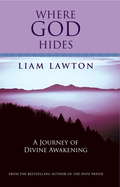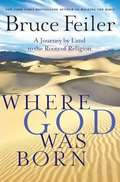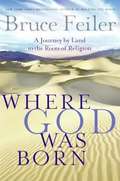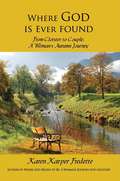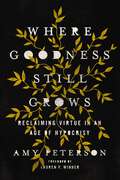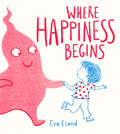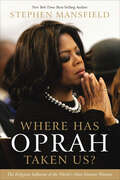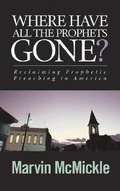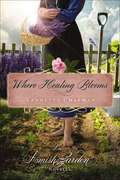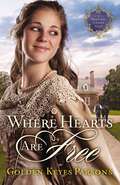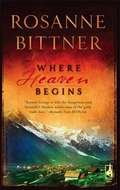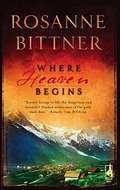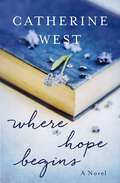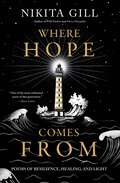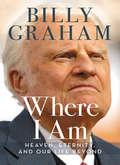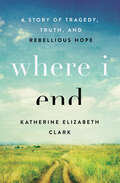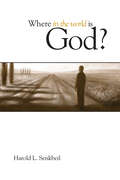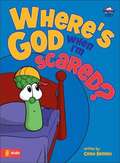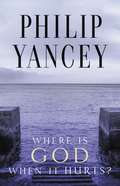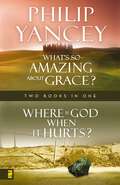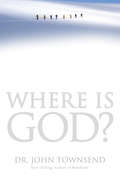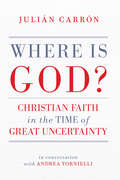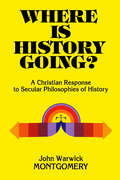- Table View
- List View
Where God Hides
by Liam Lawton'It is in great simplicity that great beauty is revealed, and only then may we discover where God truly hides.'In this moving exploration of the path to understanding God's presence, Liam Lawton considers how we bring spiritual awakening and consolation into our lives, in every circumstance.Taking inspiration from the gentle, age-old wisdom of the Book of Ecclesiastes - 'There is a time for everything, and a season for everything under the sun' - he begins his journey of reflection and contemplation.Over its course, Liam shares remarkable stories of God's revelation in ordinary human life and of the people and events that have touched him during his years of ministry, along with fascinating perspectives on his own spiritual awakening.'These pages reveal a God who does not intrude upon human living but rather is available to enter into the very depth of it and become present to those who wish for 'eyes to see and ears to hear'. Here are stories of pain and beauty, challenge and consolation, but, above all, inspiration'
Where God Was Born
by Bruce FeilerAt a time when America debates its values and the world braces for religious war, Bruce Feiler, author of the New York Times bestsellers Walking the Bible and Abraham, travels ten thousand miles through the heart of the Middle East--Israel, Iraq, and Iran--and examines the question: Is religion tearing us apart ... or can it bring us together?Where God Was Born combines the adventure of a wartime chronicle, the excitement of an archaeological detective story, and the insight of personal spiritual exploration. Taking readers to biblical sites not seen by Westerners for decades, Feiler's journey uncovers little-known details about the common roots of Judaism, Christianity, and Islam, and affirms the importance of the Bible in today's world.In his intimate, accessible style, Feiler invites readers on a never-in-a-lifetime experience:Israel Feiler takes a perilous helicopter dive over Jerusalem, treks through secret underground tunnels, and locates the spot where David toppled Goliath.Iraq After being airlifted into Baghdad, Feiler visits the Garden of Eden and the birthplace of Abraham, and makes a life-threatening trip to the rivers of Babylon.Iran Feiler explores the home of the Bible's first messiah and uncovers the secret burial place of Queen Esther.In Where God Was Born, Feiler discovers that at the birth of Western religion, all faiths drew from one another and were open to coexistence. Feiler's bold realization is that the Bible argues for interfaith harmony. It cannot be ceded to one side in the debate over values. Feiler urges moderates to take back the Bible and use its powerful voice as a beacon of shared ideals.In his most ambitious work to date, Bruce Feiler has written a brave, uplifting story that stirs the deepest chords of our time. Where God Was Born offers a rare, universal vision of God that can inspire different faiths to an allegiance of hope.
Where God Was Born: A Journey By Land to the Roots of Religion
by Bruce FeilerFeiler travels 10,000 miles through the heart of the Middle East and examines the question: Is religion tearing us apart or can it bring us together?
Where God is Ever Found: From Cloister to Couple, A Woman’s Autumn Journey
by Karen Karper FredetteHermits are a rare breed. Married hermits are about as common as spotted owls. What happens when you marry a Roman Catholic priest to a former nun and nest them in a mountainside hermitage named Still Wood? This memoir is a three-way love saga - God, a priest and a nun ministering to hermits world-wide from the isolated county of "Bloody Madison", NC. Each chapter weaves together "God-rich" incidents from four periods of my life: growth in a Catholic home; thirty years in a cloistered monastery; six years in a hermitage, and sixteen years at Still Wood, all confirming that always and everywhere "God is ever found."
Where Goodness Still Grows: Reclaiming Virtue in an Age of Hypocrisy
by Amy PetersonWhere Goodness Still Grows challenges evangelical culture and rediscovers a faith deeply rooted in a return to Jesus Christ&’s life and ministry. The evangelical church in America has reached a crossroads. Social media and recent political events have exposed the fault lines that exist within our country and our spiritual communities. Millennials are leaving the church, citing hypocrisy, partisanship, and unkindness as reasons they can&’t stay. In this book, Amy Peterson laments the corruption and blind spots of the evangelical church and the departure of so many from the faith. But she refuses to give up hope.Where Goodness Still Grows dissects the moral code of American evangelicalism and puts it back together in a new way. Amy writes as someone intimately familiar with, fond of, and also deeply critical of the world of conservative evangelicalism. She writes as a woman and a mother, as someone invested in the future of humanity, and as someone who just needs to know how to teach her kids what it means to be good. She reimagines virtue as a tool, not a weapon; as wild, not tame; as embodied, not written. Reimagining specific virtues, such as kindness, purity, modesty, hospitality, and hope, Amy finds that if we listen harder and farther, we will find the places where goodness still grows.
Where Happiness Begins
by Eva ElandThis follow-up to When Sadness Is at Your Door suggests that happiness can always be found by looking within.This helpful picture book is a great introduction to mindfulness and emotional literacy. A spare text and simple illustrations encourage readers to find happiness even if it feels far away. The book gives it a shape, turning this elusive emotion into something real while acknowledging that you can't be happy all the time. The thoughtful text reassures readers that when happiness is hard to find, they can look for it in many places. Sharing something with a friend or reaching out to someone who needs it can lead to happiness. Recognize and treasure it when you experience it, knowing that happiness begins with you. Perfect for kids and for adult readers tackling these feelings themselves!
Where Has Oprah Taken Us?: The Religious Influence of the World's Most Famous Woman
by Stephen Mansfield“Reveals the Oprah story no other dares to tell—and with a two-edged sword that rightly divides the truth from the lies.” —Star Parker, nationally syndicated columnist and media commentator New York Times bestselling author Stephen Mansfield traces the fascinating and influential life of Oprah Winfrey, profiling her quest for spiritual enlightenment—a well-publicized journey featuring a caravan of experts, mystics, and gurus—all claiming to have a prescription for inner peace and personal well-being. Mansfield shows how Oprah’s story fits into our larger cultural experience and reveals why her spiritual discoveries have resonated so loudly in today’s popular culture. In so doing, he sheds needed light on the dangers of a spiritual journey fueled solely by a desire for self-actualization.In the end, we find that the story of Oprah is, in fact, the story of us—of a generation searching desperately for something meaningful to believe in.“Stephen Mansfield offers us an unvarnished account of Winfrey’s life (and our own spiritual wandering) told graciously and irresistibly. You will be thrilled, disturbed, and astounded, but ultimately inspired and uplifted.” —Rabbi Daniel Lapin, American Alliance of Jews and Christians
Where Have All the Prophets Gone?: Reclaiming Prophetic Preaching in America
by Marvin A. McMickleThis book is intended to raise one specific challenge: the need to restore prophetic preaching to a place of urgency in the life of the American church. This book then takes on the challenge of identifying those forces and false practices that have obscured or replaced prophetic preaching in so many churches.
Where Have You Gone, God?
by Jennifer Rees LarcombeThe author examines times during the Christian life when God feels far away. Presents Scriptures pertaining to spiritual wildernesses, provides reasons that some of these deserts occur, and offers many personal stories of grief, anxiety, bereavement, and spiritual dryness. Included are ideas for making the most of a difficult time and suggestions for making one's way out of the proverbial desert.
Where Healing Blooms: An Amish Garden Novella (Amish Garden Novellas)
by Vannetta ChapmanGardens are a place to rest, to draw near, and to heal.When Widow Emma Hochstetter discovers a run-away teenager in her barn, and the bishop asks her to provide a haven for a local woman and her two children she finds her quiet life has been interrupted. Then, her mother-in-law, Mary Ann, reveals one of her garden's hidden secrets, something very unexpected. Will she continue alone or will she accept the gifts God has given her?
Where Hearts Are Free (A Darkness to Light Novel #3)
by Golden Keyes ParsonsBridget is in love with one man...and promised to another. Amid the liberty and promise of the New World, Bridget Barrington and Philippe Clavell fall in love. But nothing about their love seems possible. To pay for the Clavell family's passage from France, Philippe, a former member of French royalty, worked as an indentured slave to the Barringtons. Bridget is the heiress of the prominent plantation. When Bridget's parents discover the budding Romance between their daughter and their servant, they quickly orchestrate her engagement to an older, more advantageous match. But Edward Moorehead has a secret. And he's anything but a good match for Bridget. Separated from her true love and in danger from her betrothed, Bridget must rely on God to deliver her from darkness into light.
Where Heaven Begins
by Rosanne BittnerWith rough miners for shipmates, Elizabeth, a young, innocent and devout Christian, sets sail to search for her brother in Alaska, wild with the 1890s gold rush. When she falls overboard midjourney, she is rescued by a handsome bounty hunter, very unlike her minister brother. Together, this unlikely couple struggles to survive the rugged dangers of the beautiful Alaskan frontier. Unexpectedly, Clint comes to love her, and proposes. Elizabeth returns his love, but unless she can help Clint see that heaven is no abstraction in the sky, the grip of the past, could cost them a future together.
Where Heaven Begins
by Rosanne BittnerWith rough miners for shipmates, Elizabeth Breckenridge sets sail to search for her brother in Alaska, wild with the 1890s gold rush. When she falls overboard midjourney, she is rescued by a man very unlike her minister brother-Clint Brady, a cynical bounty hunter who shoots to kill. Together, this unlikely couple struggles to survive the rugged dangers of the beautiful Alaskan frontier. Unexpectedly, Clint comes to love her, and proposes. Elizabeth returns his love, but unless she can help Clint see that heaven is no abstraction in the sky, the grip of the past could cost them a future together....
Where Hope Begins
by Catherine WestSometimes we’re allowed to glimpse the beauty within the brokenness . . .Savannah Barrington has always found solace at her parents’ lake house in the Berkshires, and it’s the place that she runs to when her husband of over twenty years leaves her. Though her world is shaken, and the future uncertain, she finds hope through an old woman’s wisdom, a little girl’s laughter, and a man who’s willing to risk his own heart to prove to Savannah that she is worthy of love.But soon Savannah is given a challenge she can’t run away from: Forgiving the unforgivable. Amidst the ancient gardens and musty bookstores of the small town she’s sought refuge in, she must reconcile with the grief that haunts her, the God pursuing her, and the wounds of the past that might be healed after all.Where Hope Begins is the story of grace in the midst of brokenness, pointing us to the miracles that await when we look beyond our own expectations.
Where Hope Comes From: Poems of Resilience, Healing, and Light
by Nikita Gill**The Sunday Times Bestseller**Instagram superstar and poet Nikita Gill returns to her roots with her most personal collection yet, including more than twenty poems exclusive to the US edition.I took my worries outand laid them carefully on the kitchen table.Then began the slow but rewarding taskof fixing everything that needed more love.Nikita Gill shares a collection of poems crafted as the world went into lockdown, tackles themes such as mental health and loneliness, and the precarity of hope. Through the life cycle of a star, she invites the reader to feel connected to the universe, taking us on a journey through the five stages of grief to the five stages of hope.This collection includes the phenomenal &“Love in the Time of Coronavirus,&” which was shared across social media over 20,000 times, as well as Gill's poems of strength and hope, &“How to Be Strong&” and &“Silver Linings.&” Where Hope Comes From is fully illustrated with beautiful line drawings by the author.All because everything is forbidden now, I want to go up to the top of the Eiffel Tower and sing at the top of my lungs.
Where I Am
by Billy GrahamThe Final Chapter From Billy Graham While his earthly vision dims, the glory of heaven is illuminated as Billy Graham, the beloved evangelist, shares from his past, and his present, the reality of eternity. Although Billy Graham may no longer preach from the stadiums of the world, in this book you will sense his heart still beats strong with the resounding assurance that he will spend eternity with Jesus Christ, the Savior of the world. In Where I Am, Mr. Graham invites and strongly encourages all of us to contemplate our eternal hope. When asked, "Where is Heaven?" Mr. Graham has wisely replied, "Heaven is where Jesus Christ is, and I'm going to Him soon." The greatest promise ever given to the human race came from the lips of our Redeemer when Jesus said, "Let not your heart be troubled; you believe in God, believe also in Me...I go to prepare a place for you...I will come again and receive you to Myself; that where I am, there you may be also" (John 14:1-3). Just after his ninety-fifth birthday, Mr. Graham proclaimed with resolve, "When I die, tell others that I've gone to my Lord and Savior Jesus Christ--that's where I am." Flap Copy: As our nation and world travail in the midst of political, economic, and cultural uncertainties, we can find comfort in the hope that comes from the unchanging truth of God's Word. Whether talking with a US president, a world leader, or the common man or being interviewed on network television, Billy Graham has always begun his answers with "The Bible says..." In Where I Am, Mr. Graham shares what the Bible has to say about eternity from all of its sixty-six books; messages of truth, warning, love, and the certainty of the future, all gleaned by a man who would like to be remembered solely as a preacher of the Gospel of Jesus Christ. Each short chapter examines the reality that each of us chooses where to spend life after death: Heaven or Hell. From the Old Testament writer who composed "Show me Your ways, O Lord" (Psalm 25:4) to the New Testament writer who penned the words of Jesus, "Whoever believes in [Me] should not perish" (John 3:16), there is hope for anyone who puts his or her faith and trust in the One who gives us the promise, "Where I am, there you may be also" (14:3).
Where I End: A Story of Tragedy, Truth, and Rebellious Hope
by Katherine Elizabeth Clark&“Those who are hidden in Jesus, though they suffer, will discover a more beautiful ending—or should I say beginning—than they ever could imagine.&”Katherine Clark was just an average wife and mother with two young children when she was in a tragic playground accident. A little boy playing on the jungle gym jumped and landed on Kate&’s head, knocking her over and snapping her neck. Kate was paralyzed from the neck down. The doctors diagnosed her with quadriplegia and said she would never walk again.This terrifying prognosis could have been the end of the story. But instead, God chose to work a profound miracle in Kate&’s life and in the life of her family.Where I End tells the incredible story. Kate describes how God&’s presence carried her through the trying journey of re-learning to walk, both physically and spiritually. Throughout, she shares the deep theological truths that sustained her as she and her family traveled this difficult road.For fans of Ann Voskamp, Sheldon Vanauken, and Joni Eareckson Tada, Where I End offers hope, encouragement, and a timely reminder of who Jesus is: God with us. In a reflective, literary style, Kate invites readers to see pain and suffering within the context of God&’s loving, tender, powerful care—and there find hope.
Where I End: A Story of Tragedy, Truth, and Rebellious Hope
by Katherine Elizabeth Clark&“Those who are hidden in Jesus, though they suffer, will discover a more beautiful ending—or should I say beginning—than they ever could imagine.&”Katherine Clark was just an average wife and mother with two young children when she was in a tragic playground accident. A little boy playing on the jungle gym jumped and landed on Kate&’s head, knocking her over and snapping her neck. Kate was paralyzed from the neck down. The doctors diagnosed her with quadriplegia and said she would never walk again.This terrifying prognosis could have been the end of the story. But instead, God chose to work a profound miracle in Kate&’s life and in the life of her family.Where I End tells the incredible story. Kate describes how God&’s presence carried her through the trying journey of re-learning to walk, both physically and spiritually. Throughout, she shares the deep theological truths that sustained her as she and her family traveled this difficult road.For fans of Ann Voskamp, Sheldon Vanauken, and Joni Eareckson Tada, Where I End offers hope, encouragement, and a timely reminder of who Jesus is: God with us. In a reflective, literary style, Kate invites readers to see pain and suffering within the context of God&’s loving, tender, powerful care—and there find hope.
Where In The World Is God
by Harold L SenkbeilWhere is God when bad things happen?It’s a natural question, right? The list of problems that stress us out on a daily basis can be a mile long. Whether it’s financial problems, health issues, or job worries, the list goes on and on. Many people have extremely full schedules, are pulled in so many different directions, and often feel overwhelmed and frustrated—especially when things don’t go right.Where is God in all of that? He’s right there with you, dear Christian, fighting your daily battles with you.Author and pastor Harold Senkbeil’s Where in the World is God? is a powerful book of 70 devotions written for anyone facing adversity, discouragement, or fear. Step into the presence of the God who loves you through his life-giving Word.In this book, Pastor Senkbeil doesn’t presume to know all the answers to all of life’s tough questions. Instead, he directs your attention to God. These uplifting devotions proclaim God’s Word with power and promise, letting the Bible answer your questions about life with a mix of compassion and candor.If you’ve ever found yourself asking “Where in the world is God?” or “Why does God allow bad things to happen?” in your life, this devotional book will help guide you to the answer.
Where Is God When I'm Scared?
by Cindy KenneyKids will love this bedtime tale that encourages them to remember that God is bigger than the boogie man! Just like Junior, kids will realize they don't have to be scared, because God is with them at all times.
Where Is God When It Hurts?: Where Is God When It Hurts?
by Philip YanceyIf there is a loving God, then why is it that … ? You’ve heard that question, perhaps asked it yourself. No matter how you complete it, at its root lies the issue of pain. Does God order our suffering? Does he decree an abusive childhood, orchestrate a jet crash, steer a tornado through a community? Or did he simply wind up the world’s mainspring and now is watching from a distance? In this Gold Medallion Award–winning book, Philip Yancey reveals a God who is neither capricious nor unconcerned. Using examples from the Bible and from his own experiences, Yancey looks at pain—physical, emotional, and spiritual—and helps us understand why we suffer. Where Is God When It Hurts? will speak to those for whom life sometimes just doesn’t make sense. And it will help equip anyone who wants to reach out to someone in pain but just doesn’t know what to say.
Where Is God When it Hurts/What's So Amazing About Grace?
by Philip YanceyAward-winning author Philip Yancey takes you for a soul-searching look at two of Christianity’s most important topics WHAT’S SO AMAZING ABOUT GRACE? In this critically acclaimed, bestselling book, Philip Yancey explores the church’s great distinctive—grace—at street level. If grace is God’s love for the undeserving, and if Christians are its sole dispensers, then how are we doing at lavishing grace on a world that knows far more of cruelty and unforgiveness than it does of mercy? Offering compelling, true portraits of grace’s life-changing power, Yancey searches for its presence in his own life and in the church. And he challenges us to become living answers to a world that desperately wants to know, What’s So Amazing About Grace? WHERE IS GOD WHEN IT HURTS? If there is a loving God, then why is it that … ? You’ve heard that question, perhaps asked it yourself. No matter how you complete it, at its root lies the issue of pain. In this award-winning book, Philip Yancey reveals a God who is neither capricious nor unconcerned. Using examples from the Bible and from his own experiences, Yancey looks at pain—physical, emotional, and spiritual—and helps us understand why we suffer. Where Is God When It Hurts? will speak to those for whom life sometimes just doesn’t make sense. And it will help equip anyone who wants to reach out to someone in pain but doesn’t know what to say.
Where Is God?
by John TownsendHard times make us look for God. Everyone has problems. But if we could solve all our difficulties ourselves, would we ever search for God? Psychologist John Townsend says "It is actually the very unfixability of our problems and our powerlessness to bring right results that keep us asking, 'Where is God?'" With a compelling narrative, Townsend offers new insights into the pursuit for God's help and presence. Designed to give readers hope and meaning, he divides the discussion into three parts: Why does a loving God allow us to experience difficulties? How is God active in the middle of our hard times? How can I find God? With powerful stories and practical applications, Where Is God? assures readers that even when it feels as though God is absent it is his nature to be in relationship, to connect with, love, and guide us. And when we seek him with all our heart, soul, mind, and strength, he shows up in ways that transform us forever.
Where Is God?: Christian Faith in the Time of Great Uncertainty: In Conversation with Andrea Tornielli
by Julián CarrónShould we battle a plural and relativistic society by raising barriers and walls, or should we accept the opportunity to announce the Gospel in a new way? This is the challenge Christians are facing today. In an extended interview with Vatican expert Andrea Tornielli, Julián Carrón examines the historical moment we are living through in order to revive the essential core of Christian faith. Starting from the realization that the world is experiencing an evolution in which the difficulty of finding shared values and natural morality makes sincere dialogue between believers and non-believers challenging, Carrón reflects on the possibility of communicating the essence of the Christian faith in a form that can inspire interest in modern times. Addressing the central questions concerning the announcement of Christian faith in today's less regimented society, Where Is God? discovers and rediscovers the contents of Christianity and asks how they can be witnessed again in a society that is not yet post-Christian, but potentially headed in that direction.
Where Is History Going?: A Christian Response to Secular Philosophies of History
by John Warwick MontgomeryIn a closely reasoned, logical presentation, Dr. Montgomery examines such issues as: Where is History Going? / What Does a Historian Know About Jesus Christ? / The Divinity of Jesus Christ / Karl Barth and Contemporary Theology of History / Tillich's Philosophy of History / Gordon Clark's Historical Philosophy / Toward a Christian Philosophy of History. Dr. Montgomery thoroughly documents his conclusions on the basis of a wide range of authorities, and concludes that the only valid approach to history is from the Christian perspective - the authority of God, His Son, and His Word.
